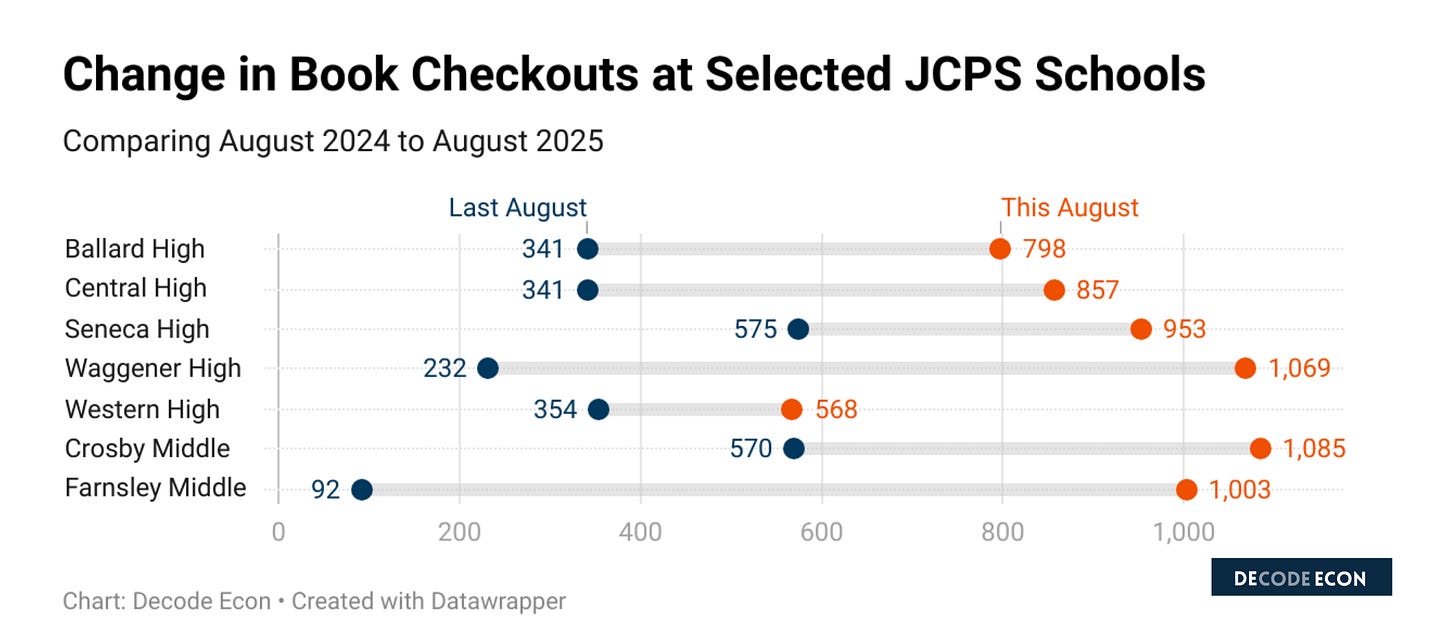What Happens When Cell Phones are Banned in High School
A story from Louisville Kentucky
This year, Jefferson County Public Schools (JCPS) introduced a cell phone ban. Although it is too early for academic research on this case, librarian data already indicate a significant change in student behavior.
Across the district, students are turning away from screens and back toward books. The results are drastic.
From Phone to Pages
At Pleasure Ridge Park (PRP) High School, librarian Erin Reed has seen the shift firsthand:
Many students have told me that since they cannot be looking at their cell phones during lunch or any other part of the school day, they are checking out books to read instead,” Reed said. “It’s wonderful!
The results are dramatic. In just the first 17 days of the 2025–26 school year, PRP students checked out more than 1,200 books. That amount is nearly half the total borrowed during all of last year.
And PRP is not an outlier. Early data shows a surge in reading across the district:
Butler High reported that 40% of the student body currently has a book checked out, double the number who borrowed books all last year.
Dr. Lynn Reynolds, executive director of library media services, says this is exactly why libraries matter:
Seeing students turn from phones to pages reminds me why libraries matter so deeply. Engagement with books is one of the best kinds of social activity at this age. It gives kids a way to connect, imagine, and grow together.
The Attention Economy
This isn’t just about books, it’s about attention. Economists treat attention as a scarce and valuable resource. In a world of endless notifications, videos, and personalized feeds, our focus has become the new currency. Businesses and platforms compete to capture and monetize it through advertising, subscriptions, and data collection. Our students have become captive audiences, and their time on their phones has pulled them away from other activities.
When phones are present, they dominate that scarce resource. Remove them, and students quickly reallocate their attention toward other activities, such as reading. By banning phones, JCPS changed the default option and revealed just how quickly behavior shifts when attention is freed up. After all, we are all competing in the new attention economy.
As a special offer, you can subscribe and receive 50% off an annual subscription. This offer is available for the next 100 paid subscribers.
The Bottom Line
The JCPS phone ban is only weeks old, but the early returns are striking: less screen time, more book checkouts, and libraries coming back to life. Sometimes, the most effective policy isn’t about adding new programs, but about removing distractions that compete with learning.
For researchers seeking a new topic and policies to examine, this is a great area to explore. What will the impact be on test scores, retention, and completion of education?
Question for readers: How do you manage your attention? Do you have a personal policy for when and how you use your phone?



I have always credited my not getting a cell phone until adult as the reason I can put it down whenever I want. That's a skill that will be harder for younger people to learn. This policy is a perfect nudge!
Should I feel guilty that I’m reading this on my phone?